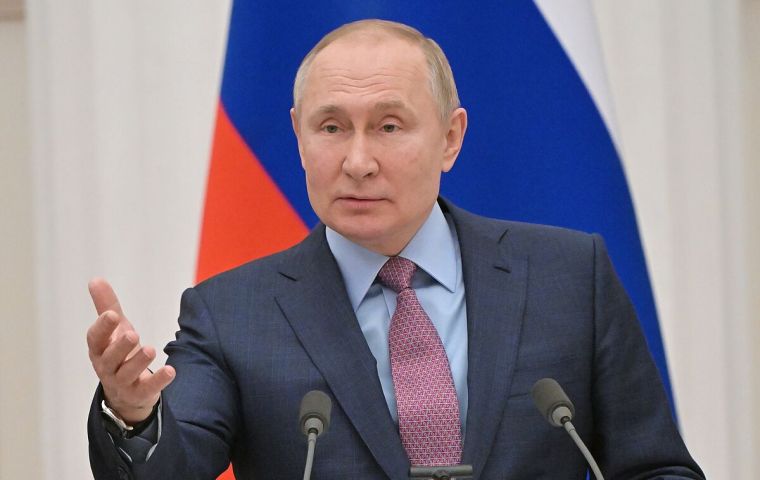MercoPress. South Atlantic News Agency
Putin bans sale of oil to countries that abide the US$ 60 cap on Russian crude
 Russia’s actions are a response to what the decree described as unfriendly actions of the U.S., foreign states and international organizations
Russia’s actions are a response to what the decree described as unfriendly actions of the U.S., foreign states and international organizations President Vladimir Putin announced Russia was banning the supply of Russian oil and oil products to countries that impose a price cap, allowing deliveries to those nations only on the basis of a special permission from the Kremlin leader.
According to the decree, the retaliatory measures are scheduled to come into effect Feb. 1 and last through July 1, 2023.
According to the Wall Street Journal, Russia’s actions are a response to what the decree described as unfriendly actions of the U.S., foreign states and international organizations that contradict international law, and are designed “to protect the national interests of the Russian Federation,” the decree said.
The European Union and the U.K. earlier this month banned the import of seaborne Russian crude, while the Group of Seven nations put a ceiling on other sales by barring Western companies from insuring, financing or shipping Russian crude at above US$ 60 a barrel.
And now, Russia has flipped the story on its head, saying the not only will it not sell below US$ 60, but it has banned the sale outright to all countries that engaged in this most glaring virtue-signaling exercise, one which paradoxically was not meant to punish Putin but to keep Russian oil flowing.
While the price cap has not seen a major impact on pricing so far, that will likely change soon: As shown below, Urals oil is trading with a generous discount to spot Brent, and was last seen around US$ 50.
In other words, those nations buying Urals - mostly China and India - are not violating the G-7 pact... yet. However, once Urals follows Brent higher, and its price rises above US$ 60/barrel that will change, and at that point it will be interesting to see how the G7 responds to the two fastest growing economies and two most populous nations openly defying the G7's Russian oil price floor.
The news, which was largely as expected, has not had an impact on the price of oil with WTI and Brent both trading at three week highs following news that China was ending zero-covid policies and reopening its economy.




Top Comments
Disclaimer & comment rulesCommenting for this story is now closed.
If you have a Facebook account, become a fan and comment on our Facebook Page!